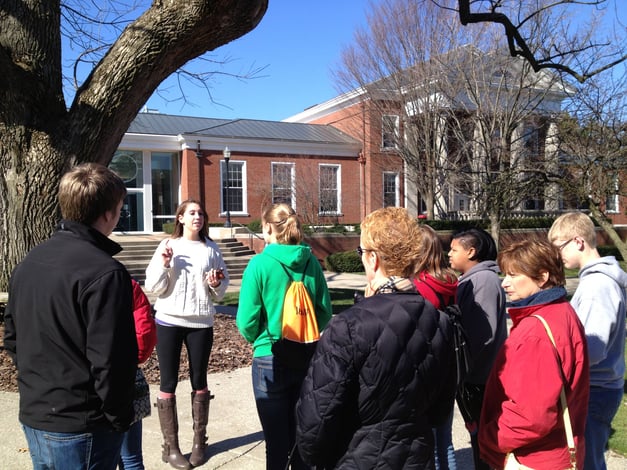As a campus tour guide, it is a pretty safe bet that one of the reasons you were chosen for your position is because you are generally happy at your school. It is also likely that if someone asked you why you chose the school you are at you would say it is because it was a good fit. The question that is more difficult to answer is what does "A good fit" mean to you?
Your ability to define this "gut feeling" and explain what it means, will separate you from other tour guides and can profoundly help the students and families who tour with you.
Working with researchers at the Positive Psychology Center at the University of Pennsylvania, we learned about the four elements of positive psychology inherent to finding the right fit. They are found in the acronym MARV:
Meaning
Accomplishment
Relationships
Vitality
Today, let's focus on "meaning". Meaning provides a sense that life matters. If you find meaning in the things you do, you have a sense that your time and effort are well spent because your actions have purpose.
Most often you will find meaning in life when what you do is aligned with your personal values. In the context of your duties as a student tour guide, take a moment and consider why you chose to take on these responsibilities and jot them down. Next, compare the reasons you listed with your personal values. Chances are that if you are enjoying your job as a tour guide and your time as a student, you will be able to make connections between your personal values and your reasons for being a tour guide.
Now consider the most likely questions prospective families have on their mind as it relates to you being their tour guide. Sure they probably want to know your name, where you are from, your major and other facts that will help them determine if they identify with you. Interestingly enough, if you were to start your tour by telling families why you chose (i.e. why it was important for you) to be a tour guide you would probably find that you could relate the more factual information about yourself in a way that would be more compelling and insightful. Indeed, explaining why being a tour guide held meaning for you would establish your credibility and at the same time remind yourself why you want to give that tour your energy and time.
Finally, if you understand that identifying the meaning in your commitments explains your own source of motivation, then why not begin to help your visiting student explore the meaning and motivations in their own decisions? Some questions you could ask (but are not limited to) are:
Why did you choose your major and how do you want to put it into practice?
Why are you thinking about this major? What impact do you expect you might make with this degree?
Do you have a favorite subject in school? What do you like about it?
What kind of things do you like to do outside of school? What do you like about doing them?
The next time you lead a tour, consider asking visiting students questions like these to help them identify the meaning in their decisions. If you do, you will almost certainly have more meaningful interactions on your tours which will, of course, provide you with more happiness!


